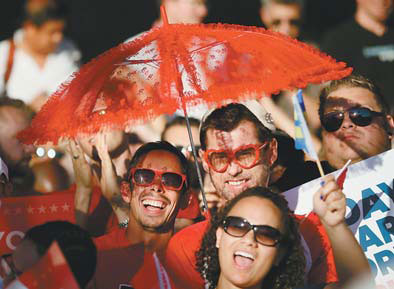Crowds cheer top court decision favoring gay marriage rights
|
People attend a rally in West Hollywood, California, after the United States Supreme Court ruled on California's Proposition 8 and the federal Defense of Marriage Act on Wednesday. Lucy Nicholson / Reuters |
It was a sweltering morning in Washington on Wednesday, but on the sidewalk outside the US Supreme Court, huge crowds were cheering as the court struck down a federal provision that denies legally married gay and lesbian couples the benefits enjoyed by other married couples.
The nine justices, however, stopped short of explicitly legalizing same-sex marriage nationwide.
In a 5-4 decision, the court first struck down Section 3 of the Defense of Marriage Act, which denied federal benefits to married gay and lesbian couples by strictly defining marriage as a union between a man and a woman.
Speaking for the 5-4 majority, Justice Anthony Kennedy said that DOMA was unconstitutional because it violated the right to liberty and equal protection for gay couples.
"By seeking to display this protection and treating those persons as living in marriages less respected than others, the federal statute" violates the Constitution, Kennedy said.
The ruling on Wednesday means that more than 100,000 same-sex couples who are legally married in the US can finally enjoy federal benefits such as tax breaks and pension rights that are available to heterosexual couples.
A Pew Center survey in May found that for the first time, more than half (51 percent) of Americans favored allowing gay men and lesbians to marry. The same survey found that 72 percent of US citizens believe that legal recognition of same-sex marriage is inevitable, regardless of whether they themselves favor or oppose it.
US President Barack Obama, currently traveling in Africa, hailed the decision. "We are a people who declared that we are all created equal - and the love we commit to one another must be equal as well," he said in a statement.
DOMA denied married gay and lesbians a raft of federal benefits that straight couples take for granted, from tax breaks to family hospital visits and the ability to sponsor a spouse for a residence visa.
The court also said a case on Proposition 8, a 2008 California voter initiative prohibiting same-sex marriage in the nation's most populous state, was improperly brought before them.
That 5-4 decision enabled the justices to dodge the thorny issue of whether same-sex marriage is a constitutional right, and means that gay marriages will likely resume in California.
Twelve US states plus the District of Columbia now recognize same-sex marriage, but about 30 states have decreed that marriage can only exist between a man and a woman.
"Now we will be married and be equal to every other family in California," said Kris Perry, a plaintiff in the Proposition 8 case, alongside her partner Sandy Stier on the Supreme Court steps.
"Thank you to the Constitution ... but it's not enough," added Stier. "It's got to go nationwide. This can't wait decades" for marriage equality to be legalized in all 50 states.
Obama is the first serving US president to come out publicly in favor of marriage equality.
White House spokesman Jay Carney said the president had telephoned 84-year-old Edith Windsor, the plaintiff in the DOMA case, and "congratulated her on this victory, which was a long time in the making".
Obama also called Chad Griffin, head of the Human Rights Campaign, the leading US lesbian, gay, bisexual and transgender civil rights group, and the plaintiffs in the Prop 8 case to congratulate them on a "tremendous victory".
US social conservatives however were outraged.
"Today is a tragic day for marriage and our nation," said the US Conference of Catholic Bishops, which urged Americans to pray to God for a review of the Supreme Court's "wrong" decision.
Celebrations erupted across the US after the decisions were announced, including in San Francisco, home to largest gay community in the US.
AFP contributed to this story.

























